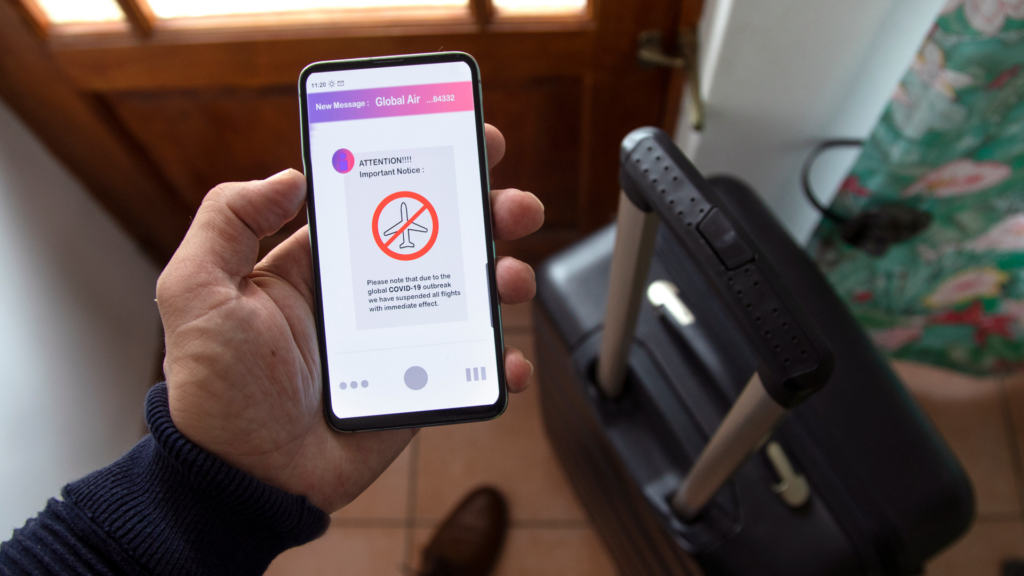This Guide to Travel Insurance will help you understand what coverage you need and have peace of mind while travelling abroad.
On this page:
Types of travel insurance
At a high-level, there are four key types of travel insurance to choose from:

How to choose which travel insurance to buy
When selecting the correct type of travel insurance, get qualified advice from a professional on what kind of coverage to buy. Our Find Insurance tool can help you find which of our member companies offer travel insurance.
Don’t be shy—ask your insurance provider as many questions as you need to feel comfortable and confident about your policy. Download our Travel Insurance Checklist Download our Travel Insurance Checklist to make sure you ask all the important questions when selecting an insurance policy that meets your needs.
How to ensure you have adequate coverage
Making sure you have enough coverage for emergency medical care expenses is essential for selecting travel insurance.
Your base coverage should include emergency medical care expenses for you and your family (if they are travelling with you.) The amount of coverage you need will depend on your situation. You can expect a coverage range from $3M to $5M CAD. Clarify the deductible—if it’s 100%, it may cost more now, but it could save you a lot of money in an emergency.
Also, find out the limit or aggregate maximum payable for everyone covered by your insurance policy. The maximum payable amount is vital if an emergency (like a natural disaster, a pandemic, or a military conflict) occurs during your trip. If your policy has a maximum payable amount, it could reduce the total amount of medical coverage you are entitled to.
There are four key things your travel insurance should always cover:

Trip cancellations
Cancellation rules depend on your insurer and your policy. You’ll need to ask questions about the conditions that allow trip cancellation, clarify if your insurer will reimburse you, and how much.
Ask the insurance company about when the policy’s effective date occurs (in other words, the date when your policy begins), which can vary depending on the type of insurance purchased. Insurers may allow you to cancel your travel insurance with a full refund before the effective date of your policy, but never assume this will be the case for you. Always ask direct questions and confirm when the effective date will occur.
You should also ask about extenuating circumstances beyond your control that could cancel a trip, like a natural disaster or military conflict. Find out which external risks are covered under your policy and what would happen in the event of such a disaster—namely, would you be refunded.
It is especially important to verify whether the insurance company will deny a claim if the travel agency, airline or other provider of travel services (including hotels) offers you a credit or voucher. Sometimes, a credit or voucher will be of no use, such as for a student whose trip to Europe in their last year of high school got cancelled.
Travel insurance exclusions to ask about
In Canada, we’re fortunate to have access to universal health care. For example, suppose Susan becomes sick with pneumonia within her hometown of Halifax and needs emergency hospital care. In that case, our Canadian universal insurance plan will cover her treatment costs.
But, if Susan becomes sick while visiting family in the United States and needs emergency treatment, she could face hefty hospital bills without adequate insurance because of certain exclusions. This is one more reason you must be careful when you purchase your insurance.
Indeed, say Susan obtained travel insurance before her trip to the US. Yet, she forgot to include details about a pre-existing condition in her insurance application. This omission could jeopardize her insurance claims for hospital care in the US and devastate her financially because her policy could be null and void. The Government of Canada will not cover these bills.
Here are four key exclusions to ask about and factor into your travel insurance purchase:

Just before you travel…
Here are a few final travel insurance preparations to make before you board that plane, train, or automobile:
- Read your policy thoroughly before you leave. If you have any questions, clarify with your insurance provider until your understanding is crystal clear. Never assume anything about the conditions of your policy.
- Document the emergency contact number for your travel insurance company on paper and make two copies. Put one copy in your luggage and always carry the other with you while you travel. Give the third copy to a friend or relative at home. Save this information on your mobile device.
- Contact your insurer as soon as possible after receiving health care while abroad to inform them of what’s happened. Ask for detailed reports and invoices from the doctor or hospital that helped you (this can be challenging when you’ve returned home.) Make copies of your medical receipts but send the originals to your insurance provider.

Top 5 reasons for denied travel insurance claims
It’s essential to be clear about your medical history and trip details; otherwise, you could face a denied claim.
These are the 5 top reasons for denied travel insurance claims:
- Undisclosed pre-existing medical information. The insurer discovers missing medical information from your application, which the insurer determines is “material to the risk.” In other words, if the insurer had this information, they either wouldn’t have issued the policy or would have charged a higher premium. Also, the missing data doesn’t need to be related to the claim that the insurer is denying. The consequence is that the policy can be cancelled.
- Pending medical tests. If your doctor has requested testing to investigate a possible medical condition and you haven’t concluded the testing and received your results by the start of your insurance coverage. Recall that the missing information doesn’t need to be related to the claim that the insurer is denying.
- Changes to your health before your trip. If your health condition changes before your insurance coverage start and you don’t inform your insurer of these changes, no matter how slight the difference may be.
- Failure to notify your insurer about a claim. If you don’t inform your insurance provider of an incurred claim as soon as possible. In other words, if you go to the hospital or receive medical care in another country and don’t promptly inform your insurance provider about the incurred claim.
- Submitting a claim too late. You try to submit a claim for a cost incurred after the coverage period because you extended your vacation and did not inform your insurance company.
If your insurer has denied your travel insurance claim and you’ve unsuccessfully appealed the claim through their internal complaints process, you can submit a complaint to OLHI for an additional review:
 OLHI – Free, impartial help with your life & health insurance complaints
OLHI – Free, impartial help with your life & health insurance complaints 